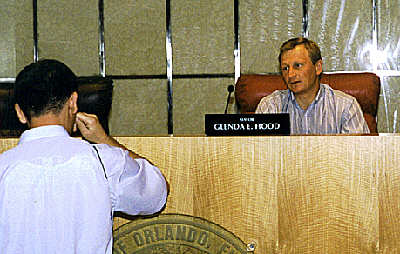![]()
General Board of Global
Ministries
![]()
UM Information
![]()
UM Reporter
![]()
![]()
Favorite Places
![]()
![]() Florida Southern College
Florida Southern College
![]()
![]() Bethune Cookman College
Bethune Cookman College
![]()
![]() FL
UM Children's Home
FL
UM Children's Home
|
|
United Methodists give Russians view of America |
|
Photo by Michael Wacht |
Nikolay
Vinogradov, a participant in the United States Library of |
| By Michael Wacht ORLANDO — As world leaders and media watched Russian President Boris Yeltsin fire the country’s prime minister and dismantle the cabinet for the fourth time in 18 months, Oleg Cheremnykh, an investment consultant from Moscow, and Nikolay Vinogradov, the chief executive officer of a cattle farm cooperative and member of the district legislature in Vologda, were visiting Orlando as part of the "Open World" Russian Leadership Exchange. The Revs. Frank and Deborah McKown, pastors of Reeves Memorial United Methodist Church and First United Methodist Church, St. Cloud, respectively, served as guides and hosts during the pair’s Aug. 6-15 visit. The exchange program was designed by the United States Library of Congress to give 3,000 current and future Russian political leaders the chance to gain firsthand knowledge of a republican government and free-market economy. Each participant spends 10 days in the United States studying its society, government and culture. The United Methodist Church and Rotary International are the program’s primary partners, each providing host families for approximately 1,000 Russians. In addition to the Orlando churches, others throughout the Florida Conference have committed to sponsoring at least 50 other Russian visitors during the next few months. Jim and Jean Henry, members of North United Methodist Church in Sarasota, sponsored Mikhail Drougov, a student at Russia’s Higher School of Economics, for his 10-day visit in July. United Methodists in the Leesburg, West Palm Beach and Tallahassee districts are also working with the denomination’s Russia Initiative to bring groups of Russian visitors to their areas in the next few months. Cheremnykh spent four years in the United States getting a master’s degree in business administration from the University of Texas at Arlington. He said he considered it an honor when the United States embassy in Moscow asked him to participate in the leadership exchange. "I view it as an opportunity to bring the people of this country a better understanding of what really happens in Russia," Cheremnykh said. "I also want to help Russians get a better understanding of Americans. The media on both sides do a bad job telling what’s really happening." Vinogradov said he had never been outside Russia before his trip to the United States and was excited about the opportunity of learning of the everyday life of Americans. "The perceptions I had about these issues from the information I received in Russia turned out to be very different from reality," he said, "especially the role of religion in the lives about Americans and the way religion is practiced." Vinogradov said he was raised Russian Orthodox, but does not actively practice his faith. Cheremnykh was raised an atheist, but was baptized in 1994 by a Baptist pastor in Texas who introduced him to God. He said he has been looking for a church home in Russia, but has not found one because the Russian Orthodox church, which is the dominant church in Moscow, is very corrupt. The time spent at church was the most meaningful part of his trip, Cheremnykh said. "The sermons and Sunday school here hit home," he said. "The religious experience…was very significant in my spiritual development." Although he was disappointed at the lack of a professional interpreter, Vinogradov said his opinions of Americans have improved and that his time in the United States has given him a vision for the future. "I will see a vision of the society that can and will be built in Russia," Vinogradov said. "And I know it can be built without revolution and bloodshed." Top
of this page |

